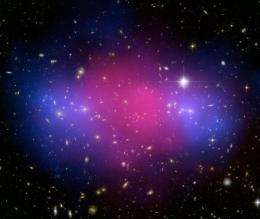'Dark energy' targeted in European space mission

So-called dark energy, believed to play a role in the accelerated expansion of the Universe, will be studied in a major science mission to be launched later this decade, the European Space Agency (ESA) said on Tuesday.
A space telescope known as Euclid will be launched in 2019 with the goal of mapping the geometry of the Universe across an unprecedented 10 billion light years.
It will seek insights into the history of the Universe's expansion and dark energy's impact on the structures of galaxies.
Saul Perlmutter and Adam Riess of the United States and US-Australian Brian Schmidt on Tuesday co-shared the Nobel Prize for Â鶹ÒùÔºics for using a type of supernova for measuring the expansion of the Universe after the "Big Bang."
In 1998 their conclusion that the Universe's expansion was speeding up, rather than decelerating as expected, took a hammer to conventional thinking in astrophysics.
Dark matter, an outward-acting force that is believed to comprise nearly three quarters of the Universe, is the suspected cosmic accelerator.
Euclid joins other mission, Solar Orbiter, as the first ventures in ESA's "Cosmic Vision" plan for 2015-2025.
Solar Orbiter, a probe due to launch in 2017, "will venture closer to the Sun than any previous mission," ESA said in a press release.
"It is designed to make major breakthroughs in our understanding of how the Sun influences its environment, in particular how the Sun generates and propels the flow of particles in which the planets are bathed, known as the solar wind."
(c) 2011 AFP



















